top twenty films of 2005 (part two)
apologies that this took so long to get back to, folks (i know you were all holding your breath). i've been boozing it up and carrying on more than usual. anyway, if you're just tuning in, i've been listing the movies that meant the most to me, that i saw for the first time during the year 2005. and here are the final ten, listed-- once again-- in the order seen...
11. underground (emir kusturica, 1995)

http://imdb.com/title/tt0114787/
well, first off, it's astounding that this film was made in 1995 (and if anyone has any stories pertaining to that, comment away!). equal parts federico fellini and bugs bunny (and less tiresome than both), underground is one of the most bombastic and ambitious films i've ever seen in my life. the closest thing i can think to compare it to is salman rushdie's novel midnight's children. both leave you feeling like you ate a big meal. a big, snarky, lyrical, historically informative and politically relevant meal.
and if that doesn't sell you, i'll add that my friend steve rented it and couldn't get the "subtitle" button on his DVD player to work, but was so impressed by the first 15 minutes that he watched all three hours of it without translation.
12. au hasard balthasar (robert bresson, 1966)

http://imdb.com/title/tt0060138/
normally, i hate martyr movies. i hate their assumptions about purity, i hate the sanctimonious, passive-aggressive ethical standards they put in place, and i hate how they take themselves too seriously. and yet, this one is a masterpiece. maybe it's the careful cinematography... maybe it's the way the opening credits are interrupted by a donkey's wail... or it could be the bawdy urgency of marie and gerard's first kiss... or the way it inhabits a universe where salvation does not dialectically imply judgment... or accordingly, the way you can't quite hate gerard, despite him causing nothing but harm from beginning to end. there's a remarkable lightness to the film, and (even more astoundingly) it creates no friction with bresson's defiant handling of form and technique. it's an intelligent film that doesn't feel cerebral. and for something with great biblical pretense, there's a remarkable amount of room within it-- it's built to occupy a variety of thoughts. if i put it on right now, it'd feel different than a day from now.
yeah. it's that sort of thing.
13. el imperio de la fortuna (arturo ripstein, 1986)
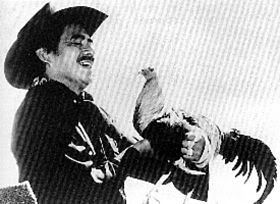
http://imdb.com/title/tt0091261/
easily the most under-rated and under-seen film on the list (and let's not pretend i'd know a thing about it were it not for sadboyq), it's also one of the most visceral. mythic in scope and intimate in scale, the film concerns a rather dim-witted man from a village in mexico who finds fortune when he stumbles upon a prize-fighting cock. what follows is a tragic, brutal investigation into the psychological mechanics of power, as well as the reality of poverty. ripstein's flair for the dramatic gives the story an epic resonance, but he never conforms to archetypal expectations. dionisio, the cockfighter, is no wide-eyed innocent; he's an opportunist as well as a simpleton. and for a film with basically no like-able characters, it never feels misanthropic. i found myself empathizing with the predicament instead of the characters. it's as surprising as it is engrossing, and it left me rather devastated.
14. tropical malady (apichatpong weersethakul, 2004)
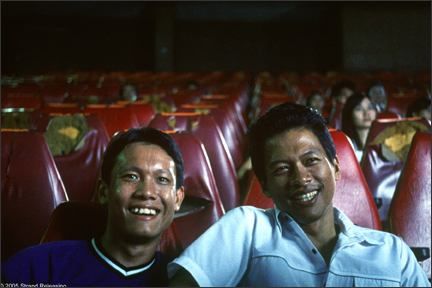
http://imdb.com/title/tt0381668/
i wrote about it here, so i won't say much. the above image accurately represents the way i feel when i think about it.
15. stage door (gregory la cava, 1937)
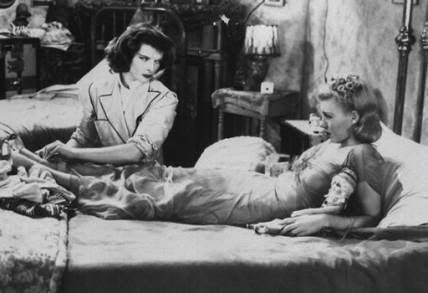
http://imdb.com/title/tt0029604/
first of all, this is a movie composed almost entirely of female characters. and unlike many other quasi-feminist katherine hepburn vehicles, it doesn't even refer back to men, necessarily. its plot is free of romantic panic, the strengths and quirks of its characters are never normalized by family or marriage, and for a film made in 1937 (by a man, i must admit) it not only makes very few assumptions about the masculinity of its audience, it also refuses to pigeon-hole its own depictions of femininity.
and it's funny as hell, too. ginger rogers totally steals the show from katherine hepburn, and the dialogue comes so rapid fire i found myself rewinding from time to time. alongside the banter, the narrative unfolds with a laid-back, quasi-plotless lucidity, calling to mind jean renoir at his best. it's fun and smart and wholeheartedly watchable... and maybe a tad bit radical, to boot.
16. playtime (jacques tati, 1967)

http://imdb.com/title/tt0062136/
as a film devoted to the mechanics of spatial alienation, tati's world is quite different from the lugubrious landscapes of bertolucci or antonioni. tati's city is no metaphorical extension of "our" own inner lack, it's just an endless array of ridiculous obstacles. he sees the modern experience through an exterior lens; he treats his frustrations as things. tati's constructed technologies have not only exceeded our ideals of convenience, they've exceeded our intentions themselves. and that produces a certain kind of comedy. the sad comedy of working-shit-out.
(p.s. this is essential viewing for all you tsai ming-liang nuts out there. you know who you are...)
17. edvard munch (peter watkins, 1974)
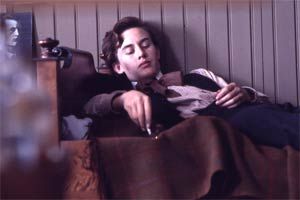
http://imdb.com/title/tt0074462/
as if i'm not being totally dramatic with these lists already, i must say two things about this one:
A. this is the best film about an artist i have ever seen.
B. were i pickin' favorites, this might well be my number one fave of the year.
watkins' usual, unmistakable style (which might be characterized as "fictive documentary", or "mockumentary"... minus the mockery) attains an unprecedented lyricism in this one; his camera glides along the faces of his non-actors with the eerie intensity of mutual curiosity. it feels like an exploration from start to finish. and for a filmmaker more identified with his radical politics than his aesthetic sensibility, the damn thing looks like a munch painting. the settings and faces mirror munch's own history and personality as perfectly as possible. you can feel the affection that went into it. it's also a rather powerful love story-- and a political one, as well. it's not so much a bio-pic as an investigation into the sexual and economic structures of turn-of-the-century norway, using munch as its way of finding love and frustration and inspiration within. in addition to being one of my greatest film experiences of the year, the quiet walk into town as i left the theatre was one of the most moving things i've felt in a while, in general.
18. the wrong man (alfred hitchcock, 1956)

http://imdb.com/title/tt0051207/
the wrong man is not so much a hitchcock film as it is the skeleton of all hitchcock films. it's hitch at his most bare-bones. every element is essential. henry fonda is exactly what the title conveys-- the man falsely accused. he's the same one that pops up in the majority of hitch flicks, only stripped to the barest necessities. the story itself is build out of the same mundane, bureaucratic hysteria that constructed kafka's castle; and its banality makes it all the more inescapable. there is great boredom within the wrong man, but it becomes a panicky sort of boredom, and the film becomes far creepier on account of it. i thought i'd seen all the "true classics" in the hitchcock oeuvre, and i stand pleasantly corrected.
(p.s. the ending of this film is, IMHO, the most subversive single moment in any hitchcock film i've seen to date.)
19. portrait of jennie (william dieterle, 1948)
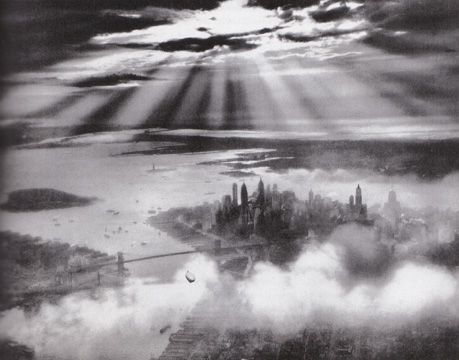
http://imdb.com/title/tt0040705/
portrait of jennie is as romantic as an al green record and as weird as david lynch. like mizoguchi's ugestsu monogatari-- which would emerge five years later-- it concerns a man in love with a ghost (and dare i say it? it's better than ugetsu). joseph cotten plays a down-and-out artist who is treated to a series of other-worldly encounters with a girl named jennie, all of which are as swoony as they are spooky. it becomes somewhat clear that jennie is at least partially a fabrication, but the film manages to maintain emotional investment in spite of its illusory revelations-- and eventually on account of them. it's a bit like tarkovsky's solaris in that regard, only it's a total hollywood melodrama. adding to the richness/spookiness/romanticism is ethel barrymore in one of the most astounding performances ever put on film, combining her visceral compassion for cotten with an occasional "may/december" sauciness that's both bawdy and dignified. dieterle matches the melodrama of his subject matter with some wild, germanic photography (see above), making the film appear as if it were painted by caspar david friedrich. valentine's day is just around the corner, y'all. take note: this flick could earn you some lovin'.
20. pather panchali (satyajit ray, 1955)

http://imdb.com/title/tt0048473/
i wrote about this rather recently, but it's worth mentioning the way the film illuminates every time apu's sister hits the screen. there's something magical and defiant and alive about her, and when tragedy eventually strikes, it feels as if the world that surrounds her simply can't live up to the standards she sets for it.
**************
...so anyway, it was a good year for movies. here's a few other super-fantastic masterpieces that just barely missed the cut for the list...
i walked with a zombie (jacques tourneur, 1943)
steamboat bill, jr. (charles f. reisner, 1928)
the grand illusion (jean renoir, 1937)
hell is for heroes (don siegel, 1962)
ulzana’s raid (robert aldrich, 1972)
a page of madness (teinosuke kinugasa, 1926)
the wayward cloud (tsai ming-liang, 2005)
the man who shot liberty vallance (john ford, 1962)
the black cat (edgar g. ulmer, 1934)
isle of the dead (mark robson, 1945)
the gospel according to st. matthew (pier paolo pasolini, 1964)
and, of course...
gymkata (robert clouse, 1985)
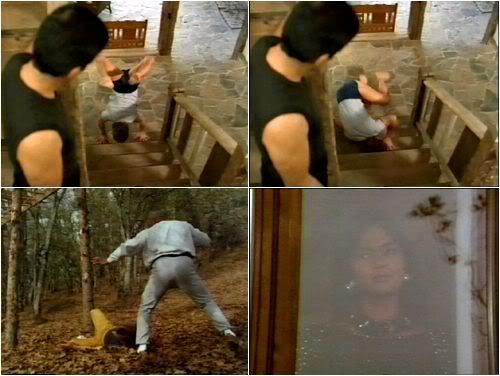
...that image is your treat for making it this far, dear reader...
11. underground (emir kusturica, 1995)

http://imdb.com/title/tt0114787/
well, first off, it's astounding that this film was made in 1995 (and if anyone has any stories pertaining to that, comment away!). equal parts federico fellini and bugs bunny (and less tiresome than both), underground is one of the most bombastic and ambitious films i've ever seen in my life. the closest thing i can think to compare it to is salman rushdie's novel midnight's children. both leave you feeling like you ate a big meal. a big, snarky, lyrical, historically informative and politically relevant meal.
and if that doesn't sell you, i'll add that my friend steve rented it and couldn't get the "subtitle" button on his DVD player to work, but was so impressed by the first 15 minutes that he watched all three hours of it without translation.
12. au hasard balthasar (robert bresson, 1966)

http://imdb.com/title/tt0060138/
normally, i hate martyr movies. i hate their assumptions about purity, i hate the sanctimonious, passive-aggressive ethical standards they put in place, and i hate how they take themselves too seriously. and yet, this one is a masterpiece. maybe it's the careful cinematography... maybe it's the way the opening credits are interrupted by a donkey's wail... or it could be the bawdy urgency of marie and gerard's first kiss... or the way it inhabits a universe where salvation does not dialectically imply judgment... or accordingly, the way you can't quite hate gerard, despite him causing nothing but harm from beginning to end. there's a remarkable lightness to the film, and (even more astoundingly) it creates no friction with bresson's defiant handling of form and technique. it's an intelligent film that doesn't feel cerebral. and for something with great biblical pretense, there's a remarkable amount of room within it-- it's built to occupy a variety of thoughts. if i put it on right now, it'd feel different than a day from now.
yeah. it's that sort of thing.
13. el imperio de la fortuna (arturo ripstein, 1986)

http://imdb.com/title/tt0091261/
easily the most under-rated and under-seen film on the list (and let's not pretend i'd know a thing about it were it not for sadboyq), it's also one of the most visceral. mythic in scope and intimate in scale, the film concerns a rather dim-witted man from a village in mexico who finds fortune when he stumbles upon a prize-fighting cock. what follows is a tragic, brutal investigation into the psychological mechanics of power, as well as the reality of poverty. ripstein's flair for the dramatic gives the story an epic resonance, but he never conforms to archetypal expectations. dionisio, the cockfighter, is no wide-eyed innocent; he's an opportunist as well as a simpleton. and for a film with basically no like-able characters, it never feels misanthropic. i found myself empathizing with the predicament instead of the characters. it's as surprising as it is engrossing, and it left me rather devastated.
14. tropical malady (apichatpong weersethakul, 2004)

http://imdb.com/title/tt0381668/
i wrote about it here, so i won't say much. the above image accurately represents the way i feel when i think about it.
15. stage door (gregory la cava, 1937)

http://imdb.com/title/tt0029604/
first of all, this is a movie composed almost entirely of female characters. and unlike many other quasi-feminist katherine hepburn vehicles, it doesn't even refer back to men, necessarily. its plot is free of romantic panic, the strengths and quirks of its characters are never normalized by family or marriage, and for a film made in 1937 (by a man, i must admit) it not only makes very few assumptions about the masculinity of its audience, it also refuses to pigeon-hole its own depictions of femininity.
and it's funny as hell, too. ginger rogers totally steals the show from katherine hepburn, and the dialogue comes so rapid fire i found myself rewinding from time to time. alongside the banter, the narrative unfolds with a laid-back, quasi-plotless lucidity, calling to mind jean renoir at his best. it's fun and smart and wholeheartedly watchable... and maybe a tad bit radical, to boot.
16. playtime (jacques tati, 1967)

http://imdb.com/title/tt0062136/
as a film devoted to the mechanics of spatial alienation, tati's world is quite different from the lugubrious landscapes of bertolucci or antonioni. tati's city is no metaphorical extension of "our" own inner lack, it's just an endless array of ridiculous obstacles. he sees the modern experience through an exterior lens; he treats his frustrations as things. tati's constructed technologies have not only exceeded our ideals of convenience, they've exceeded our intentions themselves. and that produces a certain kind of comedy. the sad comedy of working-shit-out.
(p.s. this is essential viewing for all you tsai ming-liang nuts out there. you know who you are...)
17. edvard munch (peter watkins, 1974)

http://imdb.com/title/tt0074462/
as if i'm not being totally dramatic with these lists already, i must say two things about this one:
A. this is the best film about an artist i have ever seen.
B. were i pickin' favorites, this might well be my number one fave of the year.
watkins' usual, unmistakable style (which might be characterized as "fictive documentary", or "mockumentary"... minus the mockery) attains an unprecedented lyricism in this one; his camera glides along the faces of his non-actors with the eerie intensity of mutual curiosity. it feels like an exploration from start to finish. and for a filmmaker more identified with his radical politics than his aesthetic sensibility, the damn thing looks like a munch painting. the settings and faces mirror munch's own history and personality as perfectly as possible. you can feel the affection that went into it. it's also a rather powerful love story-- and a political one, as well. it's not so much a bio-pic as an investigation into the sexual and economic structures of turn-of-the-century norway, using munch as its way of finding love and frustration and inspiration within. in addition to being one of my greatest film experiences of the year, the quiet walk into town as i left the theatre was one of the most moving things i've felt in a while, in general.
18. the wrong man (alfred hitchcock, 1956)

http://imdb.com/title/tt0051207/
the wrong man is not so much a hitchcock film as it is the skeleton of all hitchcock films. it's hitch at his most bare-bones. every element is essential. henry fonda is exactly what the title conveys-- the man falsely accused. he's the same one that pops up in the majority of hitch flicks, only stripped to the barest necessities. the story itself is build out of the same mundane, bureaucratic hysteria that constructed kafka's castle; and its banality makes it all the more inescapable. there is great boredom within the wrong man, but it becomes a panicky sort of boredom, and the film becomes far creepier on account of it. i thought i'd seen all the "true classics" in the hitchcock oeuvre, and i stand pleasantly corrected.
(p.s. the ending of this film is, IMHO, the most subversive single moment in any hitchcock film i've seen to date.)
19. portrait of jennie (william dieterle, 1948)

http://imdb.com/title/tt0040705/
portrait of jennie is as romantic as an al green record and as weird as david lynch. like mizoguchi's ugestsu monogatari-- which would emerge five years later-- it concerns a man in love with a ghost (and dare i say it? it's better than ugetsu). joseph cotten plays a down-and-out artist who is treated to a series of other-worldly encounters with a girl named jennie, all of which are as swoony as they are spooky. it becomes somewhat clear that jennie is at least partially a fabrication, but the film manages to maintain emotional investment in spite of its illusory revelations-- and eventually on account of them. it's a bit like tarkovsky's solaris in that regard, only it's a total hollywood melodrama. adding to the richness/spookiness/romanticism is ethel barrymore in one of the most astounding performances ever put on film, combining her visceral compassion for cotten with an occasional "may/december" sauciness that's both bawdy and dignified. dieterle matches the melodrama of his subject matter with some wild, germanic photography (see above), making the film appear as if it were painted by caspar david friedrich. valentine's day is just around the corner, y'all. take note: this flick could earn you some lovin'.
20. pather panchali (satyajit ray, 1955)

http://imdb.com/title/tt0048473/
i wrote about this rather recently, but it's worth mentioning the way the film illuminates every time apu's sister hits the screen. there's something magical and defiant and alive about her, and when tragedy eventually strikes, it feels as if the world that surrounds her simply can't live up to the standards she sets for it.
**************
...so anyway, it was a good year for movies. here's a few other super-fantastic masterpieces that just barely missed the cut for the list...
i walked with a zombie (jacques tourneur, 1943)
steamboat bill, jr. (charles f. reisner, 1928)
the grand illusion (jean renoir, 1937)
hell is for heroes (don siegel, 1962)
ulzana’s raid (robert aldrich, 1972)
a page of madness (teinosuke kinugasa, 1926)
the wayward cloud (tsai ming-liang, 2005)
the man who shot liberty vallance (john ford, 1962)
the black cat (edgar g. ulmer, 1934)
isle of the dead (mark robson, 1945)
the gospel according to st. matthew (pier paolo pasolini, 1964)
and, of course...
gymkata (robert clouse, 1985)

...that image is your treat for making it this far, dear reader...